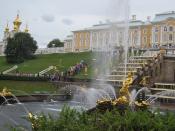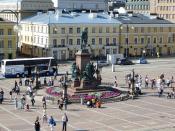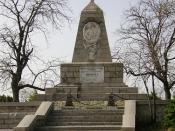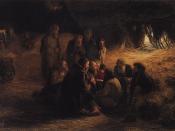In the course of studying Russian History one could justifiably ponder, "How did Russia ever eventually become a world Super Power'." considering how they repeatedly found ways to not deal with issues of the time. Take for instance the emancipation of serfdom in Russia in 1861. The Russian approach, during the reign of Romanov Rulers, to deal with issues always seems to be "What to do about this?" or "What to do about that"? Well "this" or "that" never seems to never get answered. The question of what to do about serfdom has been an enormous debate throughout the history of Russia. From the Enlightenment to the Industrial Age the tsars proved that they lacked the ability to answer the question of serfdom.
There are a string of events occurring over 200 years that would culminate in the Emancipation decree issued by Alexander II on 1861. The seriousness of serfdom discontent first became obvious to the government in 1773 when Pugachev led an army of serfs to revolt against the wealthy estate owners.
The rebellion was squashed, however, the instability of serfdom would become apparent for all of Russia, and even Europe, to see.
The invasion by Napolean would have consequences for serfdom as well. After the defeat of Napolean the Russian government was now able to deal with internal problems, mainly, "What to do about serfdom?" During the Congress of Vienna was when military leaders of Russia would get to experience The Enlightenment of Europe and the much higher standard of living than that of Russia. On their return they shared what they had seen and experienced, keeping in mind that the arts and literature in Russia were flourishing. People were writing about the Enlightenment in Europe and The Industrial Age that was beginning in London and contrasting Russia to these events.
Widespread oppression by Nicholaus I became a consequence of the Decembrist Revolt. The decline of nobility meant that the bureaucratic state now directly confronted millions of enslaved peasants. A reliance on police and a bureaucratic government grew evermore in an attempt to ensure stability in the empire. At this time the enslaved peasant question became a front runner of Russian issues, "What to do about Serfs?" That question in it self posed other questions. Considering the huge percentage of the population of serfs within Russia, what type of effect would emancipation have on the economy and how was the elite going to react? Alexander II's reign begins in the aftermath of the Crimean War. The war exposed Russia's inferior military as well as its social and economic weakness to rival European nations. Those around the tsar argued that serfdom could no longer compete with the industrialized nations in Europe. Peasant uprisings were on the increase in numbers and in sizes and fear of another Pugachev Rebellion surfaced within the bureaucracy. Alexander II now beginning question what his preceding ruling class had been unable to accomplish, how to emancipate the serfs. Russia's industrialization depended on emancipation, a crucial process in economic development, but how? From 1856, when Alexander declared that, "reform serfdom ourselves, rather than through a revolution", numerous committees were commissioned whose function was to comprise a proposal for emancipation. The dilemma of the emancipation is a paradox in it self. Giving land to the serfs meant ruin to the nobility, yet giving freedom without land compensation meant ruin to the peasantry. Government compensation to either was impossible due to the army's sustained war effort in the Crimea. The concern was over who would pay for the freedom of serfs, the land of the nobility, and would releasing 20 million people cause a rebellion? The Russian people throughout the empire had become dependent upon the serfs and their "free labor". The emancipation of serfs in Russia became a defining moment in Russian history. Once the proclamation was decreed there would be no stopping the chain of events that would follow.
In 1861 Alexander II issued the emancipation of serfdom. Freed serfs could now purchase land from their former landlords with advanced money form the government, which would get the loans back in annual redemption payments. Emancipation led administration reforms designed to allow for: the election of local government bodies, legal reform whose basis was for restructuring of the administration of justice, military reforms, a decrease in censorship, and reforms in education.
With reforms introduced along with the emancipation in 18611, the fundamentals of the land-peasantry relationship in Russia doesn't change. However, the nobility at the time of emancipation were probably happy with the Edict. Over time those sentiments would change as they begin to realize that that they, the landowners, were now responsible for the redemption payments. The landowners became responsible somewhat at their own doing. The harsh conditions they had created to keep serfs poor and tied to the land continued and now prevented the serfs from paying their taxes to the landowners, which in turn, prevented the landowners from paying redemption payments. Famines, colonization to the east, insufficient transportation, and loss of workers due to conscription of peasantry for military service and the slow introduction of industrialization in Russia all compounded with the serfs, harsh conditions slowly began to deteriorate what influence the landed nobility had on the tsar.
Secret societies that been formed in the past advocating for emancipation were now calling for overthrow of the government. The nobility had just figured out that the tsar had tricked them. Which was sort of smart on his part, why rely on the peasantry to pay for the redemption payments when you knew that they would not be able to pay it.
Economically the emancipation does not encourage economics in part because the peasants were not happy with the reforms not delivering what they expected to receive from the reforms; land ownership, true freedom, and equality. Although we could not hold the Romanov rulers wholly responsible for serfdom, however, they did little to improve economic and social conditions of the serfs. To overcome peasantry as a whole it would take the destruction of government.





